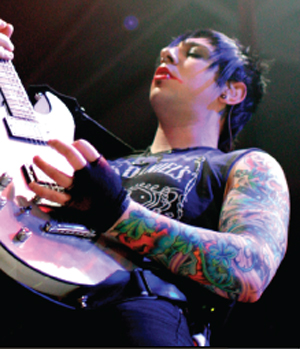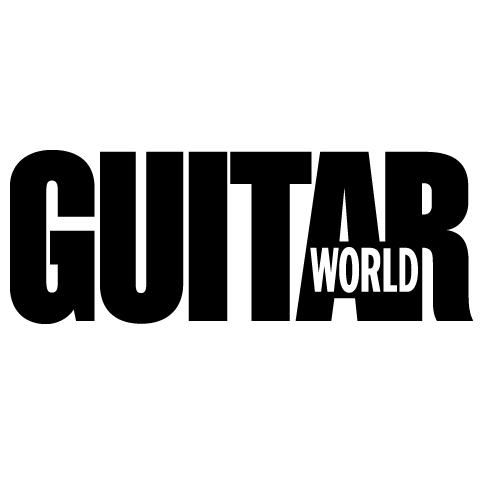Dear Guitar Hero: Avenged Sevenfold


Their band got its name from the Bible and found fame by playing the devil's music. But what Guitar World readers really want to know is about Zacky Vengeance and Synyster Gates is...
You guys have such a killer sound. What’s in your live setup? —Zakk Anderson
SYNYSTER GATES I use Bogner amps and custom-designed Schecter guitars with Seymour Duncan Invader pickups. I beef up my tone with a Boss CS- 3 Compression Sustainer. It’s kinda like my secret weapon. All this is connected to a [Voodoo Lab] GCX Ground Control Pro MIDI processor.
ZACKY VENGEANCE (Above) I’m a big fan of both Bogner Uberschall and Mesa/ Boogie Dual Rectifiers, so I switch it up between those, depending on my mood. I run from there into a Boss Compression Sustainer and a Line 6 Constrictor. From there, everything goes into a GCX ground unit. That’s really it. I try to keep it simple.
If you could collaborate with one musician, who would it be and why? —Frank Paulson
GATES Mike Patton, because he’s my favorite artist of all time. Musically, vocally, as a producer, as a label owner [Ipecac], he’s the best.
VENGEANCE That’s a tough one, but I would have to say James Hetfield. As a rhythm guitarist who plays leads, he’s as solid as it gets. I totally model myself after him. He’s the master of riffs. It would be so much fun to sit down with James and write some heavy, thrashy and melodic riffs.
Get The Pick Newsletter
All the latest guitar news, interviews, lessons, reviews, deals and more, direct to your inbox!
I hear you guys are working on your own signature guitars. When are they set to come out, and do you have any idea how much they’ll cost? —Jeff
GATES Yes, we are working with Schecter on our signature guitar models, and they should be out soon. We’re gonna do two versions: one will be more reasonably priced, and the other will be exactly like the ones we play, which will be a little more high-end and expensive.
I love your harmony lines. Who usually plays the lower main part and who plays the higher “harmony” part? What kinds of harmony do you like to use: unison, minor third, etc.? —Alex Pelnar
GATES I usually play the harmony part, because I’m a little more knowledgeable in theory than Zacky and I have a specific way I like harmonies to sound. I don’t like using fourths and fifths. Instead, I’ll come up with a harmony line made up of major and minor thirds above the melody, then I’ll drop it down an octave so that the melody is on top and the harmony line is major and minor sixths below it.
I love the solo sections in “Bat Country.” Did you use any specific exercises to get your chops up to their current level, like stuff from Michael Angelo Batio videos? —Anthony Jilton
GATES I’ve always wanted to get videos, but I’ve just never had the time. Basically, my solution is to practice what I play and challenge myself with my writing. I’m still getting a grasp on playing the solo on “Beast and the Harlot.” [laughs] I’m always in the studio writing way over my head. So when I’ve got to play live, I have to man up and practice my fucking ass off.
The first time I saw you guys play, barely 30 people were there, but you still put on an amazing show. How do you keep up the intensity in such a setting? —Curtis Gulash
GATES Wow, good question. Well, you just gotta go in there and play every show like it means something. We do that naturally, but it’s still hard sometimes. It helps if you really mesh with the guys you’re playing with and have a good time with them.
VENGEANCE Plus, if you aspire to play for more people, when you find yourself playing in front of 30 people, you’ve gotta win over those 30 people. You can’t treat it like a small show. You’re not just playing for those 30 people; you’re playing for the millions that you hope to be playing for.
I love the dual leads on City of Evil. It seems like Zacky’s lead playing has gotten way better. Zacky, did you follow a specific workout between albums or maybe sell your soul to the devil? —Jamie Oldfield
VENGEANCE [laughs] I definitely practiced my ass off. That’s the truth. With every album, I write above my ability, and my job as a guitarist is to catch up and be able to play it live. The thing about practicing is that once you master something, you don’t have to remaster it. You just keep moving forward.
City of Evil sounds like the unholy love child sired from an orgy between Pantera, Guns N’ Roses, Iron Maiden and the Beatles. What was your inspiration in making it, and how did the end product compare or contrast to what you originally set out to do? —J Cliff
VENGEANCE It’s awesome that you hear those influences, ’cause those are all bands we love. With City of Evil, we just wanted to make a diverse album with big epic sections, western-style riffs, punk rock and heavy metal parts. I think we succeeded, and we’re very happy with the outcome.
GATES This album was written very fearlessly. We were not afraid to delve into our most extreme and eclectic influences. And the more we just went for it, the more ridiculous the writing got.
You guys seem to be living a crazy Mötley Crüe–style rock life. What’s the craziest thing you’ve seen backstage? —Judah Spelmann
GATES [laughs] Well, we try to keep our personal lives to ourselves. Maybe in 10 years we’ll write a book. Everybody likes to talk about our partying, but I can guarantee we’re not shooting up heroin like Mötley Crüe. Sure, we have our own personal vices, but we just do our own thing and try to keep it private. But we always wake up at a certain time to prepare for the show, ’cause that’s the most important thing. Business comes first, but when that’s done, whatever happens, happens.
VENGEANCE Yeah, we love to have fun, but we don’t go out of our way to be psychotic. We’ve been friends for a long time and we were wild way before the band even started. There’s always crazy backstage stuff, but to be able to pinpoint one incident would be next to impossible, which might actually be a good thing! [laughs]
Synyster, how did attending the Musicians Institute impact you as a musician? Do you think you’d have been just as good a player without it? —Stephen Angus
GATES I went to Musicians Institute to study jazz. I spent six months there, and I’m a much more well-rounded player as a result. I initially set out to be a studio musician, like my father, so I went there to work on the shit I couldn’t do alone. I’ve always loved jazz, and it’s actually something I miss at this point in my life. But I didn’t learn metal there, so as far as Avenged Sevenfold goes, if I hadn’t gone to M.I. it have changed my life.
You guys have an amazing sound and chops. But I’m wondering: why do you hide your real names and wear eye makeup? —Evan Webb
GATES [laughs] It’s just what we do, brah!
VENGEANCE I think the most important thing to putting on a good show is to always mix things up. Sometimes we wear makeup; other times we don’t. The point is, you’ll never get the same Avenged show twice. I think it’s really important to be theatrical. I mean, look at Iron Maiden!
Earlier in your career, you guys used Les Pauls and SGs. What made you switch to Schecters? —Brien H.
GATES For me, Gibson is the best-playing guitar of all time. The only thing I’ve found that’s even comparable is my custom Schecter. Also, a Les Paul lacks a whammy bar and 24 frets, which I require. Besides, Gibson is a little late in the game. They just offered us an endorsement, but Schecter has been by our sides supporting us since day one.
Do you feel camaraderie or competition with other contemporary guitarists, like the guys in Lamb of God or Shadows Fall? —Ryan
GATES I’m really good friends with Johnny Donais of Shadows Fall. We’re both lead guys, so it’s funny when we sit down together to play guitar. [laughs] There’s no jam session. We just both start playing leads! [laughs] He’s an amazing guitarist, but we have different styles. Maybe five years ago I might have been more competitive, but these days I don’t think of myself as a competitive guitar player. I know what I do is different, and for what I do, I can play just as fast as the next guy.
VENGEANCE I feel nothing but camaraderie with those guys. There’s always competition when you’re in a band, but you wish everyone well. A little competition can also keep a band progressing. But as far as guitarists go, listening to the Shadows Fall guys or Zakk Wylde is very humbling. It makes me want to pick up my guitar and practice. I have such a long way to go to catch up to guitarists like that, but that’s also what keeps it fun and helps me become a better player.
You guys have a unique style of playing: crazy arpeggios, nonstop semitones, four notes on one string during a shred lick… Did you consciously set out to develop a new style? —FiL
GATES I don’t think we did. We just listen to different music all the time. Sometimes we listen to our metal forefathers, other times it’s contemporary stuff or even the production on some crazy rap record. We just take from everything.
VENGEANCE Anytime we write any style of solo, we want it to be different. We just take bits and pieces from our influences and try to make it our own.
What were your first tattoos, and how old were you when you got them? —Brad
GATES I was 15, and it was my name across my back. I heard there was a Crip called Nine who lived in Compton who gave underage kids tattoos. So me and a few of my white friends rolled into the Compton swap meet and got inked!
VENGEANCE My first tattoo was on the back of my leg. I was 16, I think. I remember driving with [singer] M. Shadows from Southern California to his tattoo artist in San Jose. I wanted a bird and a dagger, but I don’t actually know what he ended up drilling on my leg! But I do know it’s still one of the brightest tattoos I have.
Synyster, you seem to have a rather unusual picking technique. How and why did you develop it? —Ryan Voelker
GATES Unusual picking technique? Hmm…I think everybody’s different, and sure, maybe mine’s a little weird. Basically, I was self-taught for 10 years, until I went to the Musicians Institute. But by that time it was too little, too late. [laughs] They could teach me theory, but I was already playing too fast to really stop and change my picking technique.
Since 1980, Guitar World has brought guitarists the best in-depth interviews with great players, along with exclusive lessons, informative gear reviews and insightful columns that help guitarists grow and excel on their instrument. Whether you want to learn the techniques employed by your guitar heroes, read about their latest projects or simply need to know which guitar is the right one to buy, Guitar World is your guide.
“I just learned them from the records. I don’t read tabs or anything, I don’t read music – I learned by ear”: How a teenage Muireann Bradley put a cover of Blind Blake’s Police Dog Blues on YouTube and became a standard bearer for country blues
“The Strat was about as ‘out’ as you could get. If you didn’t have a Floyd Rose, it was like, ‘what are you doing?’”: In the eye of the Superstrat hurricane, Yngwie Malmsteen stayed true to the original











